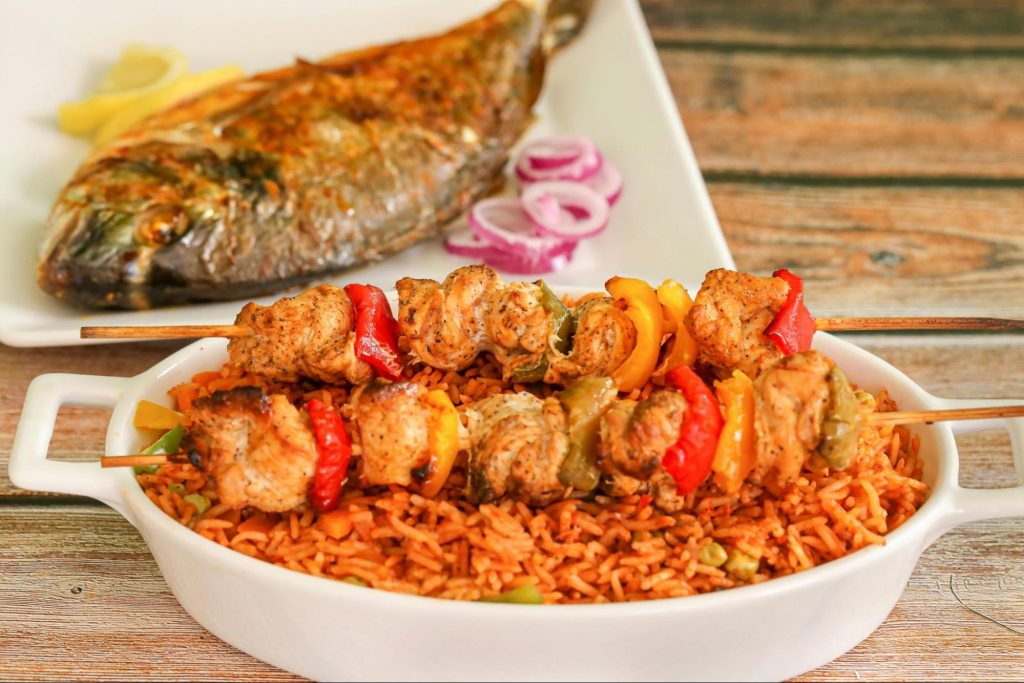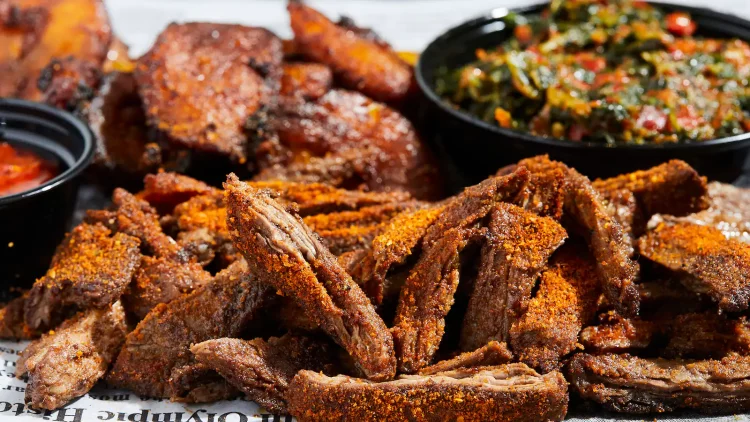In 2025, the city of Lagos isn’t just Nigeria’s commercial capital—it’s the new epicenter of West Africa’s street food renaissance. On its chaotic, colorful streets, something extraordinary is simmering, sizzling, and smoking: an underground culinary culture going global thanks to food influencers, culinary tourism, and a local tradition of bold, unapologetic flavor. While Lagos has long been known for its vibrant nightlife, Afrobeat rhythms, and legendary traffic, it’s now drawing attention for something even more visceral—its street food. From suya stalls that ignite your tongue to bubbling pots of smoky jollof rice served curbside, the city’s food scene is redefining what “world-class” means in the world of on-the-go dining. Forget polished interiors and Michelin stars. If you’re a brave eater looking to chase flavor where it lives loudest, Lagos is your next destination.
The Rise of Lagos Street Food on the Global Stage
Once a hyper-local phenomenon, Lagos street food is now making its mark on global palates. Thanks to a rising wave of Nigerian food influencers, TikTok chefs, and Instagram reels filmed right at roadside stalls, the world is finally taking notice. Suya—a spicy, charcoal-grilled meat skewer marinated with a fiery peanut-spice rub—is trending far beyond Nigerian borders. Jollof rice debates now include Lagos vendors who fry theirs with smoky firewood flavor and aromatic bay leaf bursts. Even dishes once considered too humble for spotlight—like boli (roasted plantain), akara (bean cakes), and ewa agoyin (soft beans in spicy pepper sauce)—are being rebranded as heritage dishes that deserve international acclaim.
Social media hasn’t just exported the visuals—it has brought global attention to the intense creativity and resilience behind Nigeria’s street kitchens. In 2025, Lagos food content creators like “Taste Naija” and “Chop Lagos Now” have racked up millions of views, featuring street vendors whose culinary skill rivals fine dining chefs. These stories have sparked culinary tourism across West Africa, with Lagos at its center—challenging Paris and Bangkok for the title of street food capital of the world.
Where to Find the Best Street Food in Lagos
In a city of over 20 million people, knowing where to eat isn’t just helpful—it’s survival. Street food in Lagos isn’t confined to a single district, but certain areas have earned reputations as culinary hotspots.
Start in Surulere, a middle-class neighborhood that offers everything from late-night suya grills to fried yam joints buzzing with college students and off-duty musicians. Try Shitta Roundabout after sundown, where the suya is sliced fresh and served with chopped onions, fresh pepper, and slabs of agege bread to mop it all up.
Victoria Island, often seen as Lagos’ more polished enclave, also delivers street food with upscale twists. Try the night vendors near the Kuramo Beach gate—here, you’ll find seafood pepper soup bubbling in steel pots next to mobile grills puffing with chicken wings brushed in sweet, smoky marinade. These vendors cater to late-night clubgoers, making it one of the most flavorful scenes after midnight.
In Yaba, the city’s tech and student hub, the food is fast, cheap, and wildly inventive. Spaghetti Jollof with fried egg and pepper sauce served in takeaway packs is a cult favorite. Akoka Road is the place to try puff-puff (sweet fried dough balls) still hot from the oil, and maybe the best ewa agoyin in the city—if you find the right stall, the vendor might top it with spicy fried stew and soft cow skin, known locally as ponmo.
Lagos Island, especially the Obalende area, delivers chaos and magic in equal measure. Lines snake around grilled fish stalls while buses honk and preachers shout on megaphones. It’s gritty, intense, and pure Lagos. It’s also where you’ll find fresh moi moi (bean pudding steamed in leaves), pepper snail skewers, and vendors who’ve sold from the same spot for generations.
How to Order Like a Local Without Missing a Beat
Lagos street food isn’t about menus—it’s about confidence. Many of the best vendors don’t display signage, and transactions happen fast. To eat well here, you have to embrace the energy and trust your instincts.
First tip: don’t be shy. Watch locals before you order. See what they’re eating, how they’re asking, and what garnishes they’re adding. Many vendors have their own way of doing things, and asking for “everything” usually gets you the works—onions, extra pepper, spice rub, and sometimes a surprise protein. If you’re not a fan of heat, learn this phrase fast: “No pepper, abeg.”
Cash is still king, although more vendors now accept mobile money through apps like PalmPay or Opay. Still, carry small bills to avoid payment drama.
Know your street food etiquette. Eat fast, don’t loiter, and thank the vendor, especially if they gave you the juiciest bits. Most will wrap your food in paper or foil with toothpicks or wooden skewers. Take your pack, walk a few steps, and let the flavor punch you right in the face.
Finally, know the timing. Some vendors appear only at certain hours. Suya masters work evenings. Boli and groundnut sellers come out during midday heat. Puff-puff ladies show up in the early morning or late afternoon near markets and bus stops. The rhythm of Lagos food is part of its allure—you chase it, you earn it.

Don’t Miss These Essential Lagos Street Dishes
If you only have a few days in Lagos, there are must-eat items that define the street food experience.
Suya: Grilled beef or chicken coated in a fiery blend of yaji spice (peanut powder, cayenne, salt, and secret ingredients). Served with raw onions and often folded into soft agege bread. Best eaten after dark, fresh from the coals.
Jollof Rice (Street Style): Unlike the home version, street jollof often has a deeper, smokier flavor from being cooked over firewood. Add fried plantain and grilled turkey or fried fish for a meal that sticks with you.
Akara and Ogi: Deep-fried bean cakes, golden and crispy, paired with ogi (fermented corn pap) for breakfast. Found near early morning markets.
Ewa Agoyin: Mashed beans served with a rich, dark pepper sauce and often accompanied by fried plantains or ponmo. A cult classic.
Boli and Groundnut: Charred ripe plantain grilled on open fire, eaten with crunchy roasted peanuts. Sweet, smoky, and ridiculously satisfying.
Ofada Rice and Ayamase Sauce: Native rice with a unique aroma, served with green pepper sauce packed with offal and slow-cooked meats. Available at local buka stalls and informal pop-ups.
Pepper Snail or Goat Meat: Spicy, chewy, and not for the faint-hearted. Often skewered and grilled, eaten by the roadside with cold drinks.
The Street Food Scene as Cultural Expression
Lagos street food is more than sustenance—it’s an act of defiance, creativity, and cultural pride. It’s the grandmother selling moi moi from her courtyard. The teenage boys flipping puff-puff by hand at traffic lights. The suya man whose grill setup is as sacred as a shrine. Each bite carries stories of survival, migration, history, and hustle.
Many vendors are now second- or third-generation cooks. Their stalls aren’t just food points—they’re family businesses, and each recipe is a guarded legacy. Ingredients are sourced daily, and preparation often starts hours before the stall opens. In 2025, food lovers who make the effort to engage, ask questions, and listen will find themselves welcomed into an invisible network of flavor custodians.
Why Lagos Street Food Isn’t Just “Good for Nigeria”—It’s World-Class
The term “world-class” often conjures images of elaborate plating and wine pairings, but in Lagos, world-class means flavor that makes you pause mid-bite. It means spices that unfold in waves, not one-note heat. It means smoky depth, complexity, and the kind of balance only achieved by cooks who know their ingredients intimately.
Food writers and chefs visiting Lagos in 2025 are increasingly calling it one of the most underappreciated culinary cities on the planet. And it’s not because the food is “exotic” or “cheap” or “spicy”—it’s because it’s damn good. Balanced. Bold. Addictive. Thoughtfully chaotic.
Conclusion: Flavor Beyond the Usual Map
If you’re the kind of traveler who seeks Michelin stars, Lagos might not be your first thought. But if you travel with a camera in one hand and curiosity in the other—if you chase the smell of spice through backstreets, and the hiss of meat hitting hot metal—Lagos is everything.
Here, you don’t just eat to fill your stomach. You eat to understand. To participate. To feel the pulse of a city that lives as loudly as it cooks.
So yes, you can find world-class street food in Lagos. You just have to look beyond the usual foodie map—and let the smoke guide you.





















